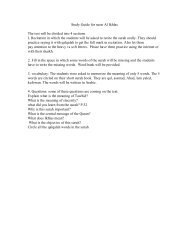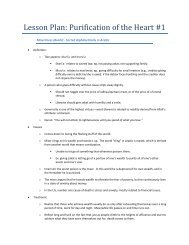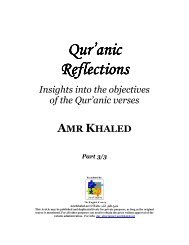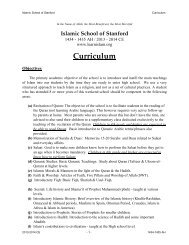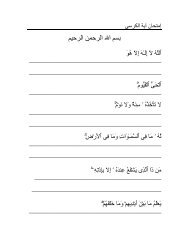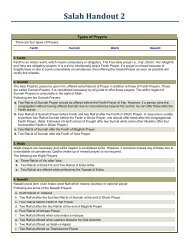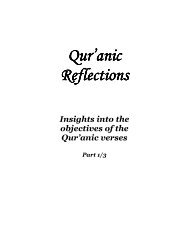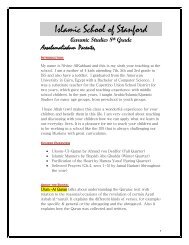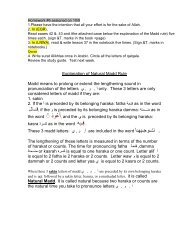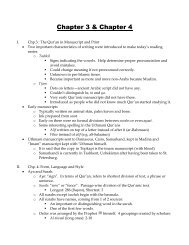Quranic Reflections - Islamic School of Stanford
Quranic Reflections - Islamic School of Stanford
Quranic Reflections - Islamic School of Stanford
You also want an ePaper? Increase the reach of your titles
YUMPU automatically turns print PDFs into web optimized ePapers that Google loves.
him <strong>of</strong>f and his brother (for a while), and send callers to the cities”. (TMQ,<br />
26:36). They want this confrontation to be public “ And it was said to the people:<br />
“Are you (too) going to assemble”(TMQ, 26:39).<br />
Prophet Ibrahim (AS) and the preaching dialogue<br />
In Prophet Ibrahim’s (SAWS) story, we find another style <strong>of</strong> dialogue, which the<br />
Surah teaches us. He starts with a rational dialogue in confronting them saying: “He<br />
said: “Do they hear you, when you call on (them) Or do they benefit you or do<br />
they harm (you)”(TMQ, 26:72-73). Because their reply was weak, he says: “He<br />
said: “Do you observe that which you have been worshipping - You and your<br />
ancient fathers Verily they are enemies to me, save the Lord <strong>of</strong> the ‘Alamin<br />
(mankind, jinn and all that exists)”(TMQ, 26:75-77).<br />
When Prophet Ibrahim (SAWS) mentions Allah the Great and Almighty, he elaborates<br />
by mentioning the attributes <strong>of</strong> Allah (SWT) “Who has created me, and it is He<br />
Who guides me. And it is He Who feeds me and gives me to drink. And when I<br />
am ill, it is He who cures me. And Who will cause me to die, and then will bring<br />
me to life (again). And Who, I hope, will forgive me my faults on the Day <strong>of</strong><br />
Recompense, (the Day <strong>of</strong> Resurrection)”. (TMQ, 26:78-82).<br />
Because the Qur’an is the core <strong>of</strong> the Prophet’s (SAWS) preaching, we find that the<br />
Ayahs that spoke about the Qur’an in the Surah, show how it considerably affect<br />
people. At the very the beginning, we read Allah (SWT) saying what can be translated<br />
as “These are the Verses <strong>of</strong> the manifest Book (this Qur’an).”(TMQ, 26:2).<br />
At the end <strong>of</strong> the Surah, and after the stories <strong>of</strong> the Prophets (Peace be upon them all),<br />
Allah (SWT) says what can be translated as: “In the plain Arabic language”. (TMQ,<br />
Surat Ash-Shuara 195). The language and rhetoric used should be suitable for the<br />
context in which the people lived. Hence, Allah (SWT) says what can be translated as:<br />
“And if We had revealed it (this Qur’an) unto any <strong>of</strong> the non-Arabs, and he had<br />
recited it unto them, they would not have believed in it”. (TMQ, 26:198-199).<br />
The Ayahs <strong>of</strong> the Surah are very clear in guiding Muslims and callers to the way <strong>of</strong><br />
Allah (SWT) to use the best and clearest means for preaching in any given time and<br />
place.<br />
Media devoted for the cause <strong>of</strong> Allah (SWT)<br />
Dear Muslim brother, when you read Surat Ash-Shu’ara, always remember that media<br />
should be one <strong>of</strong> the means used in preaching, it should not be used to promote sins,<br />
temptations and fornication; this is the Surah’s first message for mass media. The<br />
second one is addressed to the whole Ummah (Nation), especially callers to the way<br />
<strong>of</strong> Allah (SWT): that is by using the more influential ways in their address to people,<br />
taking as a model the distinguished dialogue <strong>of</strong> Allah’s (SWT) apostles with their<br />
people within the Surah.<br />
The Surah was called Ash-Shu’ara, in order to use the best means in performing<br />
Da’wa (Call to Allah). In addition, the Surah cautions against using double-edged<br />
means (media being one <strong>of</strong> them) in disobeying Allah (SWT). Instead, they should be



